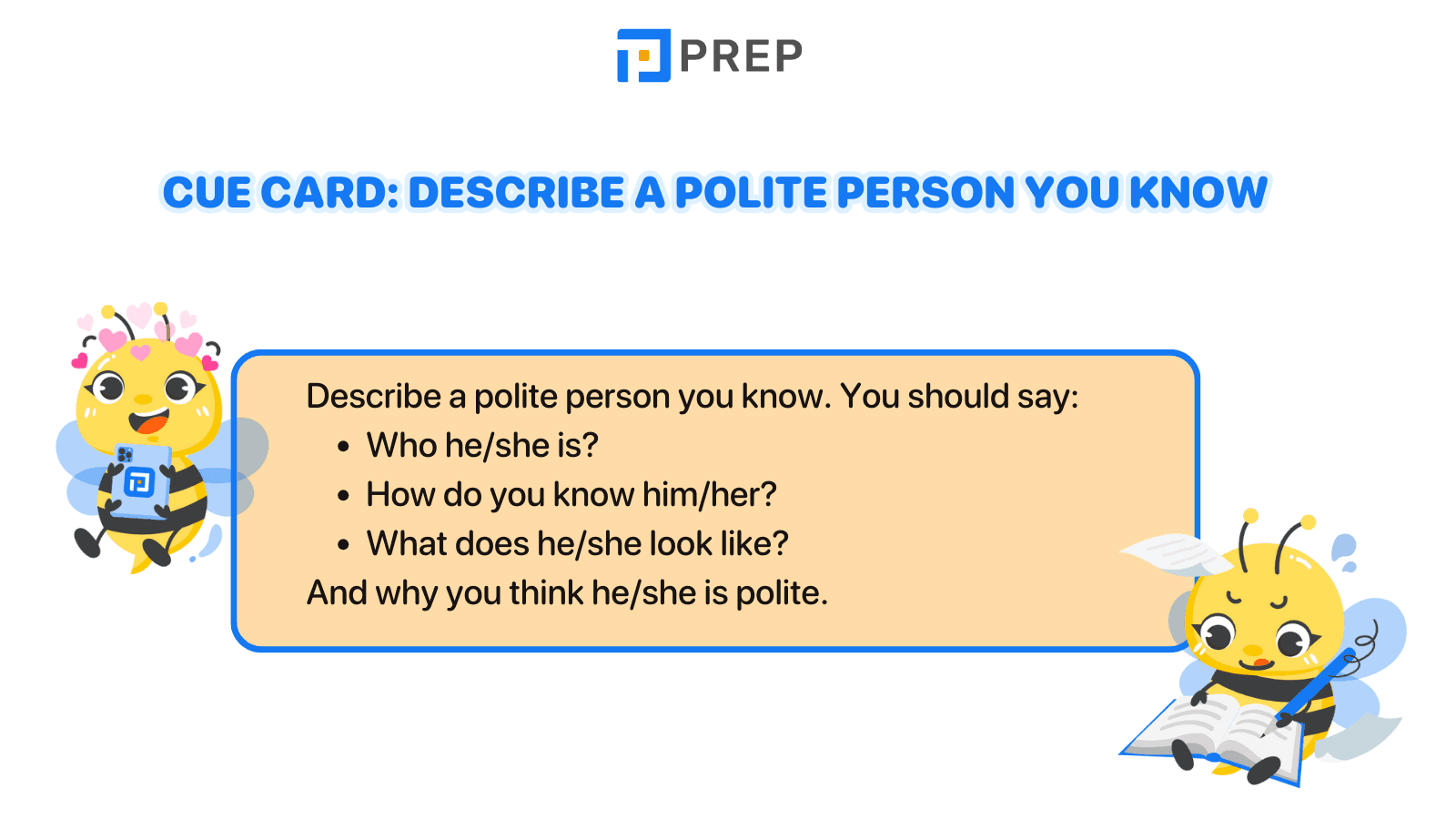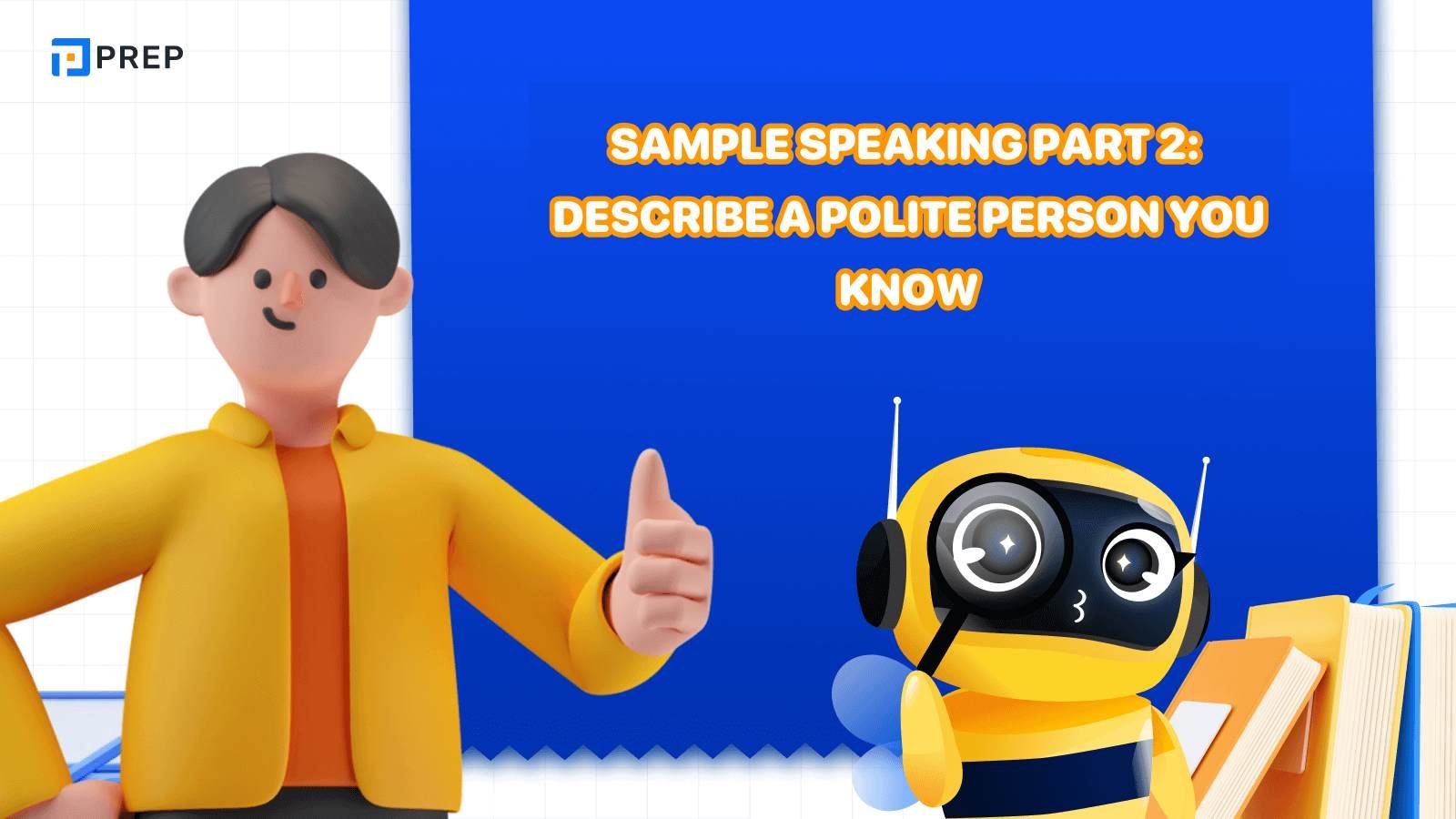IELTS Speaking Part 2, 3 sample: Describe a polite person you know
“Describe a polite person you know” is an IELTS Speaking Part 2 topic under the "Describe a person" theme. Handling this type of task will be very easy if you know how to develop an outline, expand on ideas, and use high-scoring vocabulary in your speaking. Below is an outline, ideas, a sample response, and high-scoring vocabulary compiled by the teachers at PREP. Review this to effectively practice IELTS Speaking at home!

I. IELTS Speaking Part 2 question and answer: Describe a polite person you know
1. Cue card: Describe a polite person you know

2. Outline: Part 2
2.1. Sample idea
-
The "Describe a polite person you know" task requires test-takers to describe a polite person they know, providing information on:
-
Who the person is
-
How you know this person
-
The person's physical appearance
-
Why you consider this person to be polite
-
-
The "Describe a polite person you know" task falls under the broader "People" topic. The most straightforward and effective way to handle this task is to closely follow the cues provided in the prompt and provide the clearest possible information, avoiding generalities.
-
For the first question of "who the person is", this is generally quite easy to answer, as we all know at least one polite person. All you need to do is choose someone you feel confident describing, whether it's a family member, friend, professor, or even a public figure.
-
Next, we need to go into more detail with the second question in the "Describe a polite person you know" task - how you know this person.
-
In this question, we will provide the listener with more information about the circumstances in which you met/know this person. You need to clarify where you met them, how you know them, and in what situation/context.
-
You can also go ahead and provide your answer for the next point here - describing the person's physical appearance. This is also a way for us to incorporate a description of your first impression of this person.
-
-
For the final question in the "Describe a polite person you know" task - why you consider this person to be polite - you can provide a detailed explanation and compare them to other people in order to highlight what makes this person stand out as polite.
2.2. One-minute note taking
|
Who he/she is? |
|
|
How do you know him/her? What does he/she look like? |
|
|
And why you think he/she is polite. |
|
3. IELTS Speaking Task 2 samples: Describe a polite person you know
Here is the IELTS Speaking Part 2 answer on the topic "Describe a polite person you know", written by teachers at PREP. Take a look to effectively practice for the IELTS exam at home!

Let's listen to the IELTS Speaking Part 2 sample podcast - "Describe a polite person you know":
PREP FOR IELTS · prepedu.com | Describe a polite person you know | IELTS Speaking Part 2
Occasionally, we all meet a person who stands out in the best possible way. Some might be remarkably charismatic, another one might think remarkable thoughts, and lucky for me, I have met my significant other - Quang - whose politeness made me feel respected and valuable in the way that I aspire to be more like him.
It was six years ago since we first met, yet how sincere he was stayed vividly in my recollection. I was browsing the market back then, and he managed to stand out with his beyond-good manners, one of which was wholeheartedly saying “Please” and “Thank you” for every waiter served. That was when I realized true politeness was so much more than holding open doors, and no one can ever be too old to show kindness and gratitude to others.
Modest as he was when wearing just a plain Oxford shirt and sneakers, he did set a high bar for other guys I met at that time. Undoubtedly we ended up together and had been that way since then.
The thing about a polite person is that they never stopped being so. So does my boyfriend. Whether it is having a cold glass of water ready or moving to a quieter room, he is always able to put others at ease. Having a keen eye to recognize when people are uncomfortable, graciously he knows the little things they can do to help fix that without letting the other be embarrassed.
Needless to say, life around and with him has never been difficult as the path somehow always curves itself for such unfailing kindness and politeness.
Having a strong vocabulary is crucial for success in IELTS Speaking Part 2. This section requires you to speak at length about a given topic, so having a diverse range of words at your disposal is essential. The examiner will be assessing your lexical resource - your ability to use a wide vocabulary, including less common and idiomatic terms. Focusing on expanding your vocabulary, especially topic-specific words and collocations, will allow you to describe things in more detail, use more precise language, and demonstrate your command of the English language. Ultimately, a rich vocabulary can help you achieve a higher band score in this challenging part of the IELTS Speaking test.
Here are some key vocabulary words used in the IELTS Part 2 Speaking examples on the topic "Describe a polite person you know":
-
stands out: is noticeable, prominent
-
Charismatic (adj): appealing, attractive
-
Aspire (v) to desire, wish for
-
Recollection (n) a remembrance
-
Manage to: succeed in doing something after effort
-
Modest (adj): simple, unassuming
-
Gratitude (n): thankfulness
-
Gracious (adj): courteous, kind
-
Unfailing (adj): dependable, reliable
II. Sample IELTS Speaking Part 3: Politeness
Let's listen to the IELTS Speaking Part 3 sample podcast on the topic of Politeness:
PREP FOR IELTS · prepedu.com | Topic Politeness | IELTS Speaking Part 3
1. How do people show politeness in your country?
Like many other Asian countries, Vietnamese people put a high value on politeness and good etiquettes. Since small, we have been taught to always say please and thank you - the two magic words considered the oil that keeps polite society running smoothly. As we grow older, these two words gradually become the act of respecting and showing gratitude towards others, regardless of gender, station, wealth.
This means we do view others with dignity, treating taxi drivers as well as we do a celebrity. In other words, kindness when no one else is watching was the characteristic that we Vietnamese take pride in.
-
put a high value on sth: to highly appreciate or value something
-
The oil that keeps sth running smoothly: an alternative way to express the importance of something
-
Regardless of sth: without being affected by or taking into account something
-
View others with dignity: to regard or consider others with respect and worth
2. Are people today as polite as people were in the past?
It is difficult to assert whether younger generations are now less polite than people used to be. Admittedly some are very ill-mannered but others aren’t as bad. It is now more common to see a strong sense of entitlement among teenagers, and they only stand up for themselves by putting others down, which is, to some extent, the opposite of politeness.
While some may see this as being disrespectful to others, I would like to have a more positive outlook on these behaviours and say being this bold would soon be the new definition of refined courtesy.
-
Assert (v): to state or declare firmly and confidently
-
Ill-mannered (adj): having rude or impolite behavior
-
A strong sense of entitlement: a strong belief that one deserves special privileges or treatment
-
Put others down: to criticize or belittle others
-
Have a positive outlook: to have an optimistic and hopeful attitude
-
Courtesy (n): polite, considerate, and gracious behavior
-
Refined (adj): being elegant, cultured, and well-mannered
3. Do you think politeness is different in different countries and parts of the world?
Politeness is an integral part of the society, and for that I believe it has a universal language across the globe. As its name suggests, politeness should be the act of showing empathy and acknowledgement for others’ feelings. In this way, people from all corners of the world share the same behaviours by treating each other equally with kindness and respect. You’ve probably heard of Warren Buffett. Though a shrewd businessman, he is also incredibly modest and unfailingly polite.
He has the reputation of treating everyone he meets with dignity and respect, regardless of so-called status, which is similar to what our Uncle Ho and other Eastern public figures have done in terms of showing greatest courtesy.
-
Integral (adj): important, essential
-
Universal (adj): common to or affecting all people
-
Empathy (n): the ability to understand and share the feelings of another
-
Acknowledgement (n): recognition or affirmation of the validity or importance of something
-
all corners of the world: everywhere around the world
-
Shrewd (adj): having or showing sharp judgment and discernment
-
Status (n): one's social or professional position in society
This article has provided a sample IELTS Speaking Part 2, 3 response on the topic "Describe a polite person you know", compiled by teachers at PREP. Take a look to effectively practice at home and achieve a high band score in the real exam!

Hi I'm Chloe, and I am currently serving as an Product Content Administrator at Prep Education. With over five years of experience in independent online IELTS study and exam preparation, I am confident in my ability to support learners in achieving their highest possible scores.
Comment
Premium content
View allPersonalized roadmap
Most read












